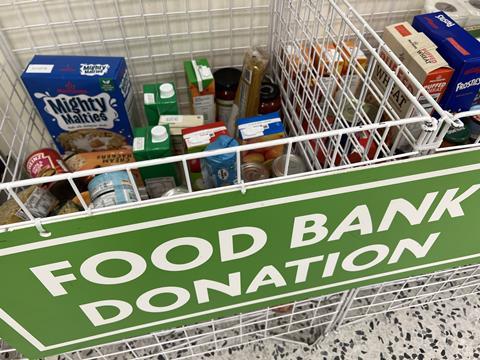Church and state must work in partnership in order to effectively serve the poor, argues Hannah Rich. Former Conservative MP Miriam Cates is wrong to pit the two against one another, she says

Referencing a recent speech by Kemi Badenoch, former Conservative MP Miriam Cates has argued in Premier Christianity that the growth in welfare spending has robbed the institutions of church, family and community of their purpose and their power.
Miriam acknowledges that rulers should “prevent the vulnerable from being exploited” and notes this was a requirement for Old Testament kings. But she adds, “The idea that the poor should be provided for is a biblical one, the belief that this must be done through state-enforced redistribution is not.”
I think a more biblical position is the task of justice and compassion is to be shouldered by all of us - both individuals and rulers in authority. Proverbs 29:14 tells us that kings who judge the poor with fairness will have their thrones established forever. If individual Christians and communities cannot abdicate their responsibility to the poor and vulnerable, then neither can governments or rulers.
Cates writes that “it is the sacred duty of the Church, through sacrificial generosity and obedience to Christ, to answer the call to remember the poor.” Well indeed, this is what tens of thousands of Christians in thousands of churches across the country do, week in week out, through the provision of food banks, night shelters, job clubs, warm spaces and love for their local communities. There is more social action today than at almost any time in our history, delivered at small scale in communities by brilliant people, many of whom are Christian.
Far from forgetting the call the remember the poor, the call has grown louder as the scale of need has grown; food bank use has grown by 51% in the last five years, according to Trussell. Repairing the social fabric of our country, and meeting the level of need, requires both state and church. We need small charities and faith groups working hand in hand to support people in ways that neither can achieve alone.
As Christians on the Left, we are not so tribal that we could not recognise the value and potential of David Cameron’s Big Society, which sought to harness the power of faith groups and the voluntary sector. The reality, though, is that it did not – could not – achieve what it set out to do.
The Christian beginnings of the welfare state
It was in response to the insufficiency of philanthropy and charity to meet the needs of Victorian Britain that the beginnings of what became Christian socialism emerged, recognising the need for economic models that afford both dignity and justice to all while holding fast to the value of collectivism and community.
The notion that the welfare state had in any way robbed the church of its power would have been alien too to William Temple, often credited with coining the phrase. Donald Soper, the Methodist minister, peer and proponent of Christian socialism, would later say in 1978 that the welfare state was “quite the most Christian thing to have happened in [his] lifetime”, but the church is no less Christian for this.
The church is uniquely placed to put relationships at the heart of serving the poor; a food bank visitor once told me that, “the difference between the job centre and the food bank is a cup of tea” and while it might seem trite, the compassionate rather than transactional approach of loving church communities has always has much to teach our statutory services.
At its best, this looks like thriving partnerships between churches, community groups and local authorities. In some of the most deprived areas of the country, there are churches hosting neighbourhood health projects, parenting classes, mental health support, addiction recovery, homeless provision and vibrant community cafés all under the same roof. None of this diminishes the church. Conversely, without the church, the capacity of state provision would lose its power here. The relationships held by the church community and the blessing of its physical presence enable better care for those who need it most.
No threat
A church that is confident in its identity need not feel threatened or robbed of its purpose by a functioning welfare state, but rather welcome its partnership in the service of the vulnerable.
There are valid reasons to want national welfare spending to be reduced, at least in part, but restoring the purpose and power of church communities whose voluntary capacity is already stretched is not one of them.
By conflating biblical notions of justice and the desire of the church to be needed, Cates prioritises an ideological vision of a small state over a Christian theological vision of a good society. The latter, we believe, requires both church and state, good policy and good will.
This is a response piece to Miriam Cates’ original article, which you can read here



































1 Reader's comment